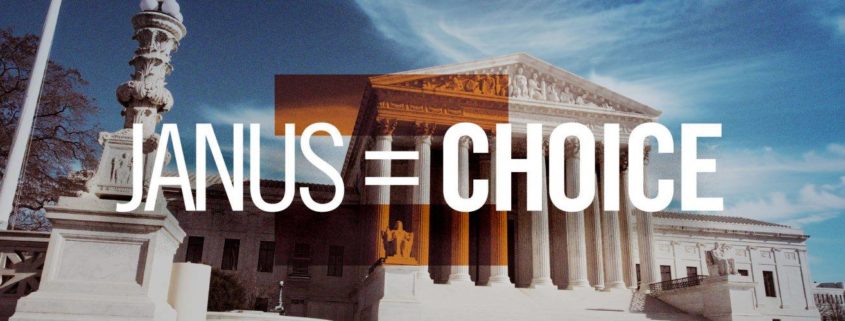Janus Public Policy Backgrounder
Janus v. American Federation of State, County, and Municipal Employees Council 31
Mackinac Center for Public Policy Backgrounder
F. Vincent Vernuccio and Patrick Wright
WHAT IS THE JANUS CASE?
Janus v. American Federation of State, County, and Municipal Employees Council 31 is a case in front of the U.S. Supreme Court filed by Mark Janus and two other Illinois state workers. If the justices rule in favor of Janus, the decision could:
- Provide right-to-work protection for all public employees in the country. Right-to-work means a union cannot get a worker fired for not paying dues or fees.
BACKGROUND
All workers, whether they are in a right-to-work state or not, have the right to leave their union.
In non-right-to-work states like Rhode Island, however, employees can only opt out of paying the political portion of their dues, and many unions require them to submit paperwork to this effect annually. These workers are called “agency fee payers.”
Unions charge agency fee payers close to the same amount they charge regular members for dues. In California, for example, teachers are required to pay around 70 percent of their dues as agency fees, and in other states this amount can be even higher.
For most labor unions in Rhode Island, the amount of agency fees is left to each union and employer to negotiate, but they are often equal to dues. The exception to this contract-by-contract flexibility is for employees of the state, who are required by law to pay agency fees equal to dues even if they do not join their respective unions (RIGL 36-11-2). Rhode Island is one of only three states in the country that requires agency fees for state employees.
The right not to pay for a union’s political agenda through dues comes from the Abood v. Detroit Board of Education case, where the U.S. Supreme Court ruled that public sector workers have a First Amendment right not to be forced to pay for union politics. Private sector workers are granted the same right through a different court decision.
Rhode Islanders need a credible alternative to the status quo and its destructive progressive ideas. You can help.
Click here to find out more >>>
The RI Center for Freedom & Prosperity is the Ocean State’s leading voice against the wreckage caused by our state’s progressive agenda.
As the state’s leading research organization, advancing family and business friendly values… the mission of our Center is to make Rhode Island a better place to call home – to raise a family and to build a career.
While progressives value government-centric, taxpayer-funded dependency… our Center believes in the value of hard work and the free-enterprise system.
We understand that in order for more Rhode Island families to have a better quality of life, that more and better businesses are needed to create more and better jobs.
Your donation will help us fight the union-progressive movement and, instead, advocate for pro-family, pro-business policies and values.
Please make a generous, tax-deductible gift to support our Center today!
show less
Many states give government unions a monopoly over representation. The Abood case allowed unions to force all workers covered by the collective bargaining agreement to pay for the expenses incurred for representation, regardless of whether the employee wanted such representation or not. The argument in Abood was that, if workers were given a choice, an insufficient number of them would offer financial support to the union, making it difficult for the union to bargain effectively on their behalf.
As of 2018, workers in 27 states can exercise right-to-work rights and are not forced to pay dues or fees to the union organized in their workplace. In right-to-work states, however, only about 20 percent of unionized workers exercise these rights, meaning that unions in these states still have the financial support of about 80 percent of workers, on average. This suggests that the fears that rationalized the Abood decision were likely overstated.
Similar Rhode Island Case
In the Ocean State, five police officers in the town of Westerly sued the city over a requirement that they pay almost 15% of their salaries to the local union. The Stephen Hopkins Center for Civil Rights, a Rhode Island–based nonprofit legal entity, litigated this case to defend non-union reserve police officers from being forced to contribute $5.00 of their $35.00 hourly pay to the union local.
Hopkins Center chairman Giovanni Cicione writes: “This was foisted on them without their consent, and these good public servants, many of whom are part-timers and retirees, are being forced to subsidize an organization they do not support and from which they receive no benefits.”
MAIN ARGUMENTS OF JANUS
Mark Janus and the other plaintiffs are asking the Supreme Court to overturn the Abood decision. They argue collective bargaining in the public sector is inherently political, and government unions devote more resources to their political agendas than just the small portion of dues that goes to directly support political candidates or causes.
On its Web page for a similar case covering teachers, the Center for Individual Rights explains, “Whether the union is negotiating for specific class sizes or pressing a local government to spend tax dollars on teacher pensions rather than on building parks, the union’s negotiating positions embody political choices that are often controversial.” Therefore, the plaintiffs say that by being forced to fund collective bargaining, they are being forced to fund political activity they might not necessarily agree with.
MAIN POINTS
- Government workers would still be able to remain in their unions, and those unions would still be able to collectively bargain. Janus would simply give workers a choice and prevent them from being fired for not paying a union.
- Giving workers a choice can make unions stronger. Unions would need to prove their worth to their membership, giving members better representation and more-responsive leadership.
- All collective bargaining by government unions is inherently political. Workers have a First Amendment right not to be forced to pay for political spending they disagree with. Therefore, workers should not be forced to support government unions.
- Unions should not have the power to get workers fired for exercising their First Amendment rights.
- While the case would essentially mean right-to-work for public employees across the country, practically it would only apply to the 22 states in which government workers are not already right-to-work and paying agency fees.
- Only about 20 percent of workers in right-to-work states exercise their rights, so the practical effect of the case will likely only affect about 20 percent of government workers in the 22 states that do not already provide these rights to workers.
KEY DATES
February 26, 2018 — The Supreme Court will hear oral arguments in the Friedrichs case
End of June 2018 — Likely decision by the court
About the Authors
F. Vincent Vernuccio is Director of Labor Policy at the Mackinac Center for Public Policy.
Patrick Wright is the Mackinac Center’s Vice President for Legal Affairs Affairs and authored the Center’s two briefs in the Friedrichs case.
The Mackinac Center is located in Midland,
Michigan.




Leave a Reply
Want to join the discussion?Feel free to contribute!